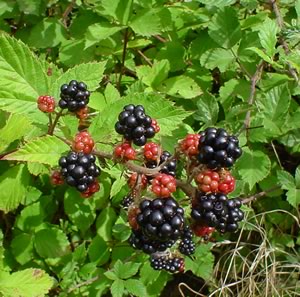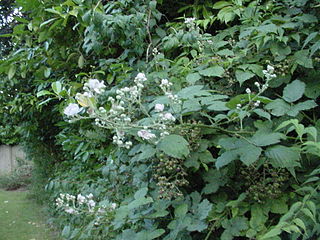
Rubus is a large and diverse genus of flowering plants in the rose family, Rosaceae, subfamily Rosoideae, with over 1,350 species.

A bramble is any rough, tangled, prickly shrub, usually in the genus Rubus, which grows blackberries, raspberries, or dewberries. "Bramble" is also used to describe other prickly shrubs such as roses. The fruits include blackberries, arctic brambleberries or raspberries depending on the species and are used to make jellies, jams and preserves.

Sparganothis pilleriana, also known as the vine leafroller tortrix, is a moth of the family Tortricidae found in the Palearctic realm. It was first described by the Austrian lepidopterists Michael Denis and Ignaz Schiffermüller in 1775.

Dorytomus taeniatus is a species of weevil native to Europe. It was first described by Johann Christian Fabricius in 1781. The larvae cause a small growth on the catkins of willows.
Rabdophaga strobilina is a gall midge which forms galls on the buds of some species of willow. It was first described by Hermann Loew in 1850.
Rabdophaga iteobia is a gall midge which forms galls on the buds of willow species.
Rabdophaga heterobia is a species of gall midges which has two generations a year and forms galls on almond willow. It was first described by Hermann Loew in 1850.
Rabdophaga albipennis is a gall midge which forms galls on the shoots of white willow.
Dasineura auritae is a gall midge which forms galls on the leaves of sallows and their hybrids. It was first described by Ewald Heinrich Rübsaamen in 1916.
Rabdophaga clausilia is a gall midge which, depending on the source, forms galls on the leaves of willows, or is an inquiline living in the galls of a Rabdophaga species, or a predator. It was first described by Johann Jacob Bremi-Wolf in 1847.
Euura dolichura is a species of sawfly belonging to the family Tenthredinidae. It was first described by Carl Gustaf Thomson in 1871. The larvae feed within galls on the leaves of willow. Some of the Euura species of sawfly are closely related and placed in groups of similar species. E. dolichura is a member of the Euura dolichura species group.
Euura proxima is a species of sawfly belonging to the family Tenthredinidae. The larvae feed on the leaves of willows and was first described by Jean Guillaume Audinet-Serville in 1823.
Euura bridgmanii is a species of sawfly belonging to the family Tenthredinidae. The larvae feed on the leaves of sallows. It was first described by the entomologist Peter Cameron in 1883.
Euura vesicator is a species of sawfly belonging to the family Tenthredinidae. The larvae feed internally in a gall on the leaves of purple willow and its hybrids. It was first described by Johann Jacob Bremi-Wolf in 1849.

Euura viminalis is a species of sawfly belonging to the family Tenthredinidae. The larva feed within galls on the leaves of willows. It was first described by Carl Linnaeus in his landmark 1758 10th edition of Systema Naturae.
Dasineura fraxini is a gall midge which forms galls on the leaves of ash. It was first described by Johann Jacob Bremi-Wolf in 1847.
Dasineura acrophila is a gall midge which forms galls on the leaves of ash. It was first described by Johannes Winnertz in 1853 an is found in Europe.
Spanioneura fonscolombii, is a species of plant-parasitic psyllid in the family Psyllidae which feed on box. It was first described by Arnold Förster in 1848 and is found in Europe. It is also found in the United States of America where it was accidentally introduced.

Diastrophus rubi is a species of gall wasp in the family Cynipidae that live on the stems of bramble. The insect was first described by the German entomologist Peter Friedrich Bouché in 1834 and is found in Europe.

Lasioptera rubi is a species of gall midge in the family Cecidomyiidae and is found in Europe. It was first described in 1803 by the German priest, botanist and entomologist, Franz von Paula Schrank. The larvae feed within the tissue of brambles, creating abnormal plant growths known as galls.






